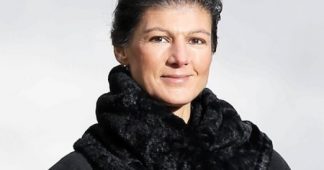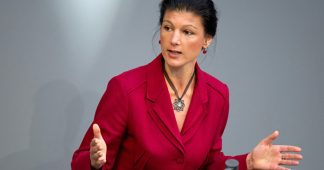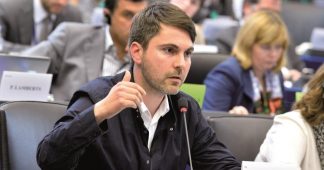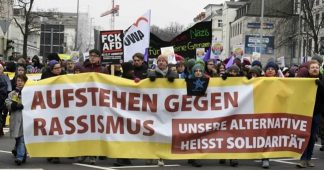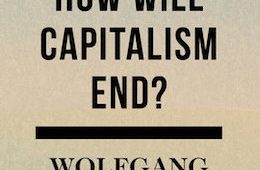by 15 September 2018
As spokesperson for the Die Linke party in the Bundestag (with Dietmar Bartsch), Sahra Wagenknecht comes from the anti-capitalist left of the party and has long been its most popular representative. With her husband Oskar Lafontaine – both with high media profiles – she has been involved for some time an informal group called “Team Sahra”, which you can join on the internet and which argues for the creation of a new political movement in the image of France Insoumise (FI), led by Jean-Luc Mélenchon. They have announced that this movement will be launched in September 2018, not in competition with Die Linke, but to put pressure on the other parties in the sense of a more social policy.
Certain positions developed by Wagenknecht and Lafontaine lie to the right not only of the party’s anti-capitalist wing, but also of its official program. The designated enemy is no longer capitalism, but unbridled neoliberal capitalism. “Open borders” are referred to as a neo-liberal bourgeois project to exacerbate competition among those at the bottom and to weaken wage-earners and reduce real wages. The defence of democratic conquests involves defending the sovereignty of nation states against the European Union and projects – for example that of Macron – to strengthen European integration within it. Basically, the project of Wagenknecht and Lafontaine aims to weaken the extreme right, to counter the electoral breakthrough of the Afd and to win over layers of German wage earners and the “left behind” who, while unhappy with the Social Democratic Party (SPD) and attracted by the demagoguery of the Alternative for Germany (Afd, far right), do not identify with the positions of Die Linke. According to Wagenknecht and Lafontaine, Die Linke is wrong to ignore their fear of unfavourable competition with immigrants.
In a recent interview on Mediapart, Wagenknecht explains (rightly) that the project traditionally linked to the “governmentalist” right of Die Linke is no longer realistic: [1] This project of union of the lefts is currently not a majority project. The SPD is currently at 17% of the voting intentions and, although still in government, it could experience a rapid decline. On the other hand, today’s SPD has moved far from the traditional positions of social democracy. It is in its third “Grand Coalition” with Merkel’s conservative union.”
The SPD’s terrible electoral crisis is linked to the fact that this party has never broken with Agenda 2010 and its ferocious counter-reforms. This, according to Wagenknecht, is what motivates the project to launch a new broad movement centred on social themes: “Before this the Social Democrats carried out the neoliberal reforms of Gerhard Schröder’s Agenda 2010, which is the opposite of a policy of equality and social protection. This has led to the creation of a huge low-wage sector in Germany, which in turn causes enormous social insecurity. All of these things have nothing to do with our political programme. That is why we are in the process of preparing the launch of a broad popular movement, open to all those of good will on the left. It must bring together all those who still believe in certain elements of a classic social democratic policy.”
Wagenknecht says she does not want a return to the early 1970s. But what she opposes to neoliberalism and unbridled capitalism is above all a welfare state, national, with more social security and more protection against the bad effects of capitalist globalization. The international solidarity of wage earners and the oppressed plays almost no role in her political discourse. For her, it is the state that must protect the people, and especially the most disadvantaged: “I mean by that we want to promote the values of a more social state, higher and fairer wages, an autonomous European foreign policy, a disarmament policy and so on. It is of course not about returning to the social democratic programme of the 1970s. The world has evolved, and we need to modernize. On pensions, for example, it is not a question of patching up the old system, but of creating a new system of insurance where everyone would contribute, from the civil servant to the self-employed, and not just the employee as today.
“It is a question of proposing a programme in which the state protects people from unbridled capitalism, from globalisation driven by multinationals and from competition sharpened by social dumping. We want to rebuild a state that has an active policy for the least-favoured half of the population and for those who are the losers from the present situation.”
Members and currents of Die Linke who support the approach of Sahra Wagenknecht and Oskar Lafontaine are not very numerous. There is also no clear indication of the number of positive responses to the call that will be sufficient to create the new movement in September. Criticisms of the project in the debate within Die Linke, formulated in a sharp way, especially by Antikapitalistische Linke, are located at three different levels of argumentation:
– First, Wagenknecht and Lafontaine have not submitted their positions to the discussion and decisions of the bodies of Die Linke. Indeed, Wagenknecht relies on her personal popularity, presence in the media and personal political following to short-circuit any controversy about her approach in her own party. The polarizing dynamics of this approach in the party seem to be linked to the rivalry with the two party spokespersons, Katja Kipping and Bernd Riexinger.
– Secondly Wagenknecht and Lafontaine adapt too much to the discourse of the Afd and “right-wing populism” by rejecting demands such as “open borders” for fear of losing the possibility of politically influencing disadvantaged Germans.
– Thirdly, there is the fear, and not just on the left wing of the party, that the launch of the new movement will harm Die Linke. As Wagenknecht and Lafontaine keep repeating that Mélenchon’s France Insoumise serves them as an example, this fear is quite understandable, because FI was built on the ashes not only of the Front de Gauche, but also of the French Parti de Gauche.
Wagenknecht argues that Die Linke has not been able – so far – to take advantage of the SPD’s electoral crisis: “The main alternative that is opposed to me is that everyone who is unhappy with the situation just has to join Die Linke. Beautiful! But that doesn’t work. For years we have been hoping that SPD voters who are disappointed come to join us. But the reality is that since 1998, the SPD has lost more than 10 million voters. And we won 2 million. So, there are at least 8 million voters who have not come to us.”
To the question “Is the fear of creating a competitor party to Die Linke not justified?” Wagenknecht responds “No. Creating a party does not seem to me to be a mandatory step. The aim of the movement is to put pressure on the parties to oblige them, the SPD in the first place, to follow a more social policy.” But then, is the good example of Mélenchon’s FI not to be followed? This is not easy to understand.
In any case, there seems to be a link between the orientation – if you like, “left populist” – and the forms of organizations of France Insoumise and the movement that Oskar and Sahra want to build: “normal” people can join, they can come and applaud, but they cannot participate in developing positions and preparing initiatives. In this beautiful new world, it is the tribunes that do everything and decide everything.
For the content, it is necessary to take seriously the argument of competition and popular concerns advanced by Wagenknecht: “So refugees, who are also poor, are looking for social apartments, often in small, even disadvantaged neighbourhoods. However, Germany is sorely lacking in social housing because the government has followed a policy of austerity. Competition in housing is getting stronger as refugees are brought in. The situation has also deteriorated in many schools not really located in beautiful neighbourhoods and which already had big problems before 2015. Finally, in the low-wage sector, where low-skilled people are employed, competition has become fierce… I believe that at present, and for some time now, democracy will only work well within the framework of nation-states.”
To the argument of competition, there is no point in opposing a purely humanitarian and moralistic attitude, which does not care about the realities and feelings of the disadvantaged popular strata. It is clear that the demand for “open borders” doesn’t solve all the problems. It must be part of a set of transitional demands including minimum wages and sufficient social provision, a tax system that makes the rich pay, a drastic reduction in working time without loss of wages and with proportional hiring, and so on.
But above all, to the argument of competition, we cannot oppose a purely national “proletarian class interest” … which is totally fictitious. Real class interests are articulated only by common international solidarity action for the same objectives, whether at European or global level.
P.S.
If you like this article or have found it useful, please consider donating towards the work of International Viewpoint. Simply follow this link: Donate then enter an amount of your choice. One-off donations are very welcome. But regular donations by standing order are also vital to our continuing functioning. See the last paragraph of this article for our bank account details and take out a standing order. Thanks.
Published at http://internationalviewpoint.org/spip.php?article5704

